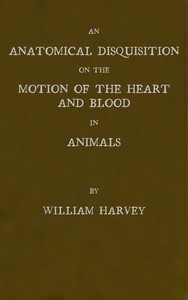An Anatomical Disquisition on the Motion of the Heart & Blood in Animals by Harvey
"An Anatomical Disquisition on the Motion of the Heart & Blood in Animals" by William Harvey is a scientific publication written in the early 17th century. The work is a foundational text in physiology, presenting groundbreaking theories on circulation and heart functions. Harvey explores the mechanics of blood circulation, challenging long-held beliefs and arguments posited by ancient authorities. The opening of this treatise begins with an editor's introduction that provides context about
the scientific revolutions of the 16th century, noting how previous reliance on the works of ancient scholars hindered progress in medical science. Harvey acknowledges the errors in conventional understanding regarding the heart, blood vessels, and the flow of blood. He sets the stage for his extensive observations and experiments, emphasizing the crucial role of directly observing bodily functions rather than exclusively relying on ancient texts. This portion highlights his commitment to empirical evidence and positions him as a pioneer of modern physiology, making a strong case for the necessity of questioning traditional doctrines in pursuit of scientific truth. (This is an automatically generated summary.)
Read or download for free
| How to read | Url | Size | |||
|---|---|---|---|---|---|
| Read now! | https://www.gutenberg.org/ebooks/67065.html.images | 539 kB | |||
| EPUB3 (E-readers incl. Send-to-Kindle) | https://www.gutenberg.org/ebooks/67065.epub3.images | 1.1 MB | |||
| EPUB (older E-readers) | https://www.gutenberg.org/ebooks/67065.epub.images | 1.1 MB | |||
| EPUB (no images, older E-readers) | https://www.gutenberg.org/ebooks/67065.epub.noimages | 283 kB | |||
| Kindle | https://www.gutenberg.org/ebooks/67065.kf8.images | 1.2 MB | |||
| older Kindles | https://www.gutenberg.org/ebooks/67065.kindle.images | 1.1 MB | |||
| Plain Text UTF-8 | https://www.gutenberg.org/ebooks/67065.txt.utf-8 | 456 kB | |||
| Download HTML (zip) | https://www.gutenberg.org/cache/epub/67065/pg67065-h.zip | 1.0 MB | |||
| There may be more files related to this item. | |||||
Similar Books
About this eBook
| Author | Harvey, William, 1578-1657 |
|---|---|
| Author of introduction, etc. | Parkyn, Ernest Albert, 1857- |
| Editor | Rhys, Ernest, 1859-1946 |
| Translator | Willis, Robert, 1799-1878 |
| Uniform Title | De motu cordis. English |
| Title | An Anatomical Disquisition on the Motion of the Heart & Blood in Animals |
| Alternate Title | The Circulation of the Blood |
| Alternate Title | An Anatomical Disquisition on the Motion of the Heart and Blood in Animals |
| Original Publication | United Kingdom: J. M. Dent & Co.,1906. |
| Note | Reading ease score: 40.7 (College-level). Difficult to read. |
| Note | Wikipedia page about this book: https://en.wikipedia.org/wiki/Exercitatio_Anatomica_de_Motu_Cordis_et_Sanguinis_in_Animalibus |
| Contents | An anatomical disquisition on the motion of the heart and blood in animals -- The first anatomical disquisition on the circulation of the blood, addressed to John Riolan -- A second disquisition to John Riolan -- Letters -- The anatomical examination of the body of Thomas Parr, who died at the age of one hundred and fifty-two years; made by William Harvey -- The last will and testament of William Harvey. |
| Credits | Thiers Halliwell, Bryan Ness and the Online Distributed Proofreading Team at https://www.pgdp.net (This file was produced from images generously made available by The Internet Archive/American Libraries.) |
| Language | English |
| LoC Class | QP: Science: Physiology |
| Subject | Blood -- Circulation |
| Category | Text |
| EBook-No. | 67065 |
| Release Date | Jan 1, 2022 |
| Copyright Status | Public domain in the USA. |
| Downloads | 290 downloads in the last 30 days. |
| Project Gutenberg eBooks are always free! | |


